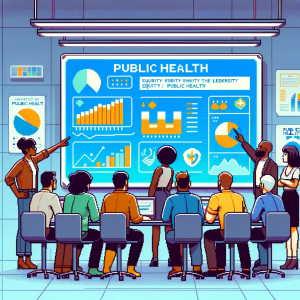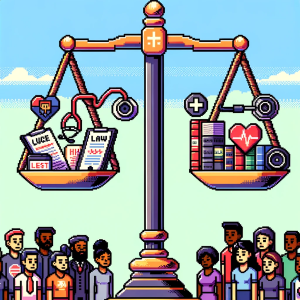
The Two-Edged Sword of Data: Navigating Structural Racism and Health Inequities
The article Structural Racism, Health Inequities, and the Two-Edged Sword of Data: Structural Problems Require Structural Solutions provides a critical examination of how structural racism ingrains health disparities and how the data used to analyze these disparities can serve as both a tool and a hindrance.
The Double-Edged Sword of Racialized Data
Racialized health inequities are not just numbers but are indicative of deeper societal issues. The article argues that while data is crucial for identifying and addressing these inequities, it also poses significant risks. The first edge of the sword represents the non-use of data, leading to ignorance and inaction against existing health disparities. The second edge signifies the problematic use of data, potentially perpetuating stereotypes or supporting discriminatory practices. Navigating this double-edged sword requires a delicate balance, ensuring data is used responsibly and effectively to promote health equity.
The Proposal for Change: A Structural Approach
Recognizing the need for a structural solution to a structural problem, the article proposes two significant changes:
- Enforceable Requirements for Conceptualization of Racialized Groups: This includes a mandate for all U.S. health data sets and research projects funded by the government to explicitly explain and justify their conceptualization and categorization of racialized groups.
- Analysis of Health Data in Relation to Racialized Societal Inequities: This means any health data concerning racialized groups should also consider societal contexts like economic and social conditions, which significantly impact health outcomes.
These proposals aim to ensure that the data used to understand and combat health inequities is robust, fair, and conducive to promoting health equity.
The Urgent Need for Action in Public Health
The article underscores the urgency of these issues, especially in light of recent events like the COVID-19 pandemic and the racial reckoning following assaults on democratic institutions. It’s a call to action for public health practitioners and policymakers to critically evaluate and modify how racialized data is used, ensuring it serves as a tool for justice and equity rather than perpetuating existing disparities.
Final Thoughts: Moving Towards Health Equity
The task ahead is formidable but essential. As the article suggests, it’s time to re-engage and re-envision how racialized health data is governed and used, moving out of the shadows of grievance politics and into a new era of informed equitable public health practice. By understanding the two-edged sword of data, health professionals and researchers can better navigate the complex landscape of racial health inequities, using data as a beacon for change rather than a chain of the status quo.
Be the Health Change-Maker – Get Informed Weekly!
Step into the role of a public health change-maker with ‘This Week in Public Health.’ Each issue brings you closer to the heartbeat of community health, innovative research, and advocacy. It’s more than news; it’s a platform for transformation. Subscribe for free and join a community of informed individuals driving positive change in public health every week!



